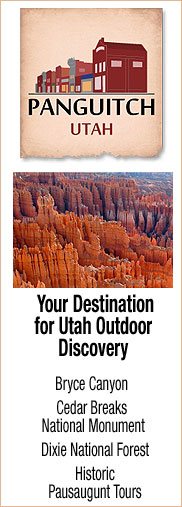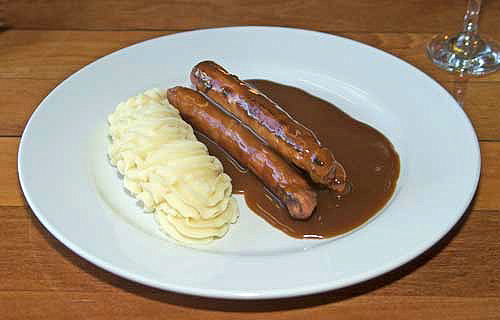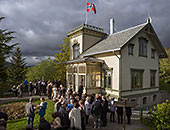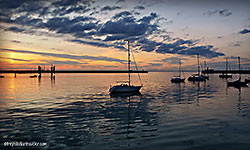 |
 |
|
 |
 |
|
Bangers and Mash Bangers and Mash is a traditional English dish made of mashed potatoes and sausages, generally prepared with flavored pork sausage. The dish is sometimes served with rich onion gravy and fried onions.
The term "Bangers" is attributed to the fact that the sausages, particularly the kind made during World War II under rationing, contained a lot of water and would explode in the pan under high heat. Fortunately, the modern bangers do not have this attribute. Britain has had a long love affair with sausages, with 5 million eaten every day. Bangers and Mash has a strong iconic significance as a traditional British working-class dish. A Cary Grant biographer once said that it was Cary’s favorite dish. British soldiers were known to boil them in their helmets when on the front lines. The dish, even when cooked at home, is an example of pub grub — quick and easy to make in large quantities as well as being hearty and delicious. Here's a Bangers and Mash recipe, provided courtesy of Keith Richards. Yes, Keith Richards.
While you’re at it, check out Keith’s delightful new autobiography, Life.
|
Hi Audrey, Love your lamb shanks. --- Paul, Scottsdale AZ
Haven't been called Tad for . . .gee, maybe I've NEVER been called Tad . . . guess I'm the only one with chutzpah enough to mention Bourdain. BRILLIANT? --- Ken, Shutesbury, MA
I think we must have had an entirely different experience in the UK. (Fresh Food and Real Ale – week 1). We were up in Edinburgh and they served something called ‘Neeps & Tatties.’ The items were boiled so long that I couldn’t even recognize what I was eating. Come to think of it… I couldn’t taste them either. Later I found that Neeps’ are Turnips and ‘Tatties’ are potatoes. --- Lindy, Phoenix, AZ
My mouth was watering as I read some of your descriptions of the fantastic fare of ... England? I had always felt smug about the lowly reputation of British cuisine as this gave us at least one country with a worse culinary reputation than America's. I guess I'll have to change my views. Your article made me actually want to take a CULINARY tour of Britain. Yummy yummy yummy. --- Sandy Miner, Portland, OR Thanks for your note. Thanks to Traveling Boy I get to interview a world famous chef this week who is widely recognized as spearheading the Yummy movement in Ireland. Guess I'll have to take yet another culinary tour a little further north and check it out... (I love my job!) --- Audrey
Very interesting, mouth-watering piece by Audrey! (A McDreamy McMeel). Your web site is fascinating! --- Susie, Victoria, BC
Combining travel, food, and intelligent advice -- BRILLIANT! Your site fills a long-felt need for hungry roamers. Keep it up! It's Anthony Bourdain with reservations and CLASS. --- Tad, Boston, MA
|
|
| |||
This site is designed and maintained by WYNK Marketing. Send all technical issues to: support@wynkmarketing.com
|

|



















